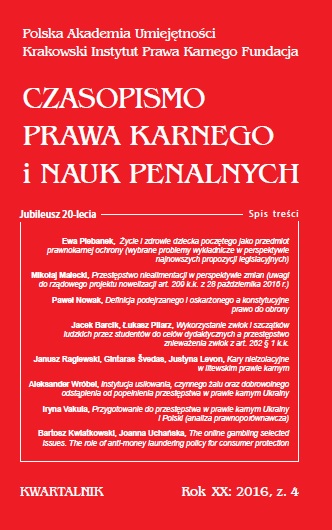Kary nieizolacyjne w litewskim prawie karnym
Non-custodial penalties in the Lithuanian criminal law
Author(s): Janusz Raglewski, Gintaras Švedas, Justyna LevonSubject(s): Criminal Law
Published by: Polska Akademia Umiejętności / Krakowski Instytut Prawa Karnego Fundacja
Keywords: non-custodial penalties; fine; limitation of liberty; criminal policy; Lithuanian Criminal Law; comparative criminal law
Summary/Abstract: We współczesnej nauce prawa karnego coraz większego znaczenia nabiera przekonanie, że izolacja skazanego, jako konsekwencja zastosowania sankcji karnej, nie może stanowić podstawowego instrumentu walki z przestępczością. W polityce karnej prowadzi to do zwiększenia roli kar nieizolacyjnych. Analiza obejmuje ogólną charakterystykę tego rodzaju środków prawnokarnej reakcji w litewskim prawie karnym. Przedmiotem rozważań uczyniono regulacje prawnokarne kraju, któremu w polskiej literaturze karnistycznej poświęcono dotychczas stosunkowo mało uwagi. Zastosowana metoda prawno-porównawcza (bazująca nie tylko na brzmieniu stosownych przepisów, ale również danych statystycznych) przekonuje, że w polityce karnej realizowanej na gruncie polskiego i litewskiego ustawodawstwa kary nieizolacyjne mają istotne znaczenie w zwalczaniu drobnej i średniej przestępczości. Mimo wspólnej optyki, wyraźnie zauważalne równice występują w zakresie opisanych normatywnie podstaw aplikacji tego rodzaju środków penalnych. Ustawodawca litewski wykazuje dużą powściągliwość we wprowadzaniu do części ogólnej materialnego prawa karnego podstaw stosowania grzywny i kary ograniczenia wolności. Zasadnicza różnica występuje w podejściu do instytucji warunkowego zawieszenia wykonania kary pozbawienia wolności. W Polsce ustawodawca dąży do ograniczenia jej stosowania, na Litwie mamy zaś do czynienia z wręcz przeciwną tendencją. The belief that the isolation of the convict cannot be the basic instrument to fight crime is becoming increasingly important in the modern science of criminal law. This leads to an increase of the role of non-custodial penalties in the criminal policy of different countries. The analysis in this article covers the general characteristics of non-custodial penalties in the Lithuanian criminal law. The authors decided to analyze the legal regulations of the mentioned country, as in Polish literature it has been paid relatively little attention. The legal-comparative method used in the article and based not only on the wording of the relevant provisions, but also the statistical data, showed that non-custodial penalties are essential measures in the criminal policy of Poland and Lithuania in fight against petty and middle crime. Despite the common features in the criminal policy of mentioned countries it is also clearly noticeable that there is a difference in the normative basis for the application of non-custodial penalties. In Lithuania, the legislature has a high self-restraint in the introduction to the General part of the Lithuanian Criminal Code as many normative basis for the use of fines and restriction of liberty as it is in Polish criminal law. The main difference in approach exists with regard to the institution of conditional suspension of a penalty of deprivation of liberty. In Poland, the legislator seeks to limit its use, in Lithuania – almost the opposite tendency is noticed.
Journal: Czasopismo Prawa Karnego i Nauk Penalnych
- Issue Year: 20/2016
- Issue No: 4
- Page Range: 107-124
- Page Count: 18
- Language: Polish

